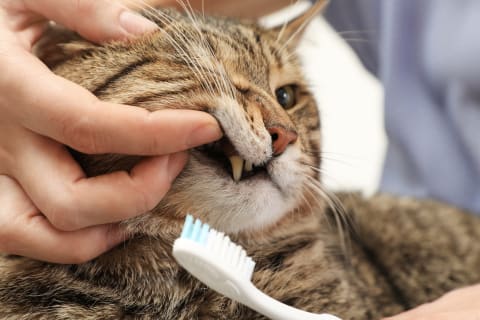Just like humans, cats can experience oral health issues, so us cat parents need to be proactive about keeping their teeth clean. Our Bartlett vets share a few tips on developing a successful oral health care routine.
Tips for Keeping Your Cat's Teeth Clean
Cats often hide physical pain out of instinct (thousands of years of natural selection will do that to an animal). However, our feline friends can experience oral health issues just like we can.
That’s why cat parents need to be ever-diligent about their oral health and keeping our furry companion’s teeth clean, so problems can be caught as soon as possible and hopefully, both pain and uncomfortable and expensive procedures can be avoided.
Take Your Cat for Annual Dental Checkups
As part of their annual visit to the veterinarian, cats should have a dental checkup. During the appointment, your vet will evaluate your cat’s oral health in addition to their overall physical health and let you know if they need a professional veterinary dental cleaning or surgery.
Implement a Daily Dental Care Routine
Just like people, our cats need a daily oral health and dental care routine to make sure their teeth stay as clean and healthy as possible. When they’re young, it’s a good idea to get your kitty used to having their teeth brushed.
Get the okay to do this from your vet first, as even kittens may have oral health issues that will need correcting before their teeth can be brushed.
As you might imagine, you’ll want to ease your cat into this routine, so wait until she’s calm and relaxed, and follow these steps:
- Gently lift her lips, then use your finger to massage her teeth and gums for a few seconds.
- Start with low-key expectations - you may only reach one or two teeth the first few times you try this. Stop before she gets too annoyed.
- Give lots of praise and a yummy treat after your teeth-and-gum massage. The goal is to build your cat’s tolerance to the experience, gradually increasing the length of time you spend on the task.
- Once your kitty has become used to having you massage her teeth and gums on a regular basis, you can gradually introduce a toothbrush and toothpaste designed especially for cats (never use your own toothpaste, as it contains ingredients that are toxic to our feline companions). Look for flavors that appeal to them, such as beef or chicken.
- Start with the brushing as gradually as you did the teeth-and-gum massage; your cat may begin with licking just a small dab of toothpaste from your finger (you may even have the opportunity to test a few different flavors). Find a brush that has soft bristles made for cats’ delicate gums.
While some cat owners find success with a small piece of soft gauze, others find a finger brush works for their felines. Still others apply dental gel with the toothbrush or a finger, and have the gel do the work for them.
When you do start brushing the teeth, move along the gum line, working quickly but stopping before your cat becomes irritated (it may take her weeks before you find she tolerates having all of her teeth cleaned within a session).
Beware that your cat may react by scratching or biting if teeth cleaning stresses them out too much. If you opt to spare your fingers, you can also consider dropping additives such as plaque remover into their drinking water, getting them specially designed chew toys or providing dental treats and cat food.
Whether you use teeth brushing, special treats or food, chew toys or drinking water additives, there are several products out there that can help with keeping your cat’s teeth clean. Of course, they’ll also need a regular professional dental cleaning performed by a qualified veterinarian to keep their teeth in tip-top condition.
Is your pet due for a dental cleaning? Contact our Bartlett area vets to book an appointment for your pet to see one of your compassionate vets.

Looking for a vet in Memphis?
We're always accepting new patients, so contact our veterinary hospital today to book your pet's first appointment.Related Articles View All
Chipped Tooth in Dogs - What to Do if Your Dog Has a Broken Tooth
Dogs often experience chipped or fractured teeth. Is a broken dog tooth an emergency? It might be. Today's post contains information about broken teeth in dogs and what to do about dog tooth fractures.
Large Dog Care & Saving Money with Wellness Plans
What do large and giant breed dogs need to stay healthy and happy? Here, we provide vital information on how to proactively care for your giant or large dog's health and save money along the way.
Tooth Problems & Dental Disease in Dogs
Regular dental care is essential for keeping your dog's teeth healthy, but sometimes, even with regular care, dog teeth problems can occur. Today, our Bartlett vets discuss common dental issues in dogs and what to do.
What is CDA in Dogs & What Causes It
Primarily affecting Dobermans, color dilution alopecia (CDA) is a genetic skin disorder that leads dogs with 'blue' or 'light fawn' (Isabella) fur to experience patchy hair loss and itchy skin. Here, our Bartlett vets discuss the causes of CDA, other breeds affected, and treatment.
